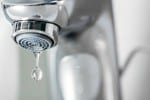The Evolution of a Water Softener
Water softening services are necessary in most parts of the country, including Central Pennsylvania. Many water customers suffer from soap scum, spotty dishes, graying clothes, mineral deposits on faucets, and dry skin. Hard water is the culprit. Luckily, the modern water softener can clear up all of these issues, leaving the customer with crystal clear water that does not damage clothes, dishes, skin, or hardware.
A Brief History of Hard Water
 The term “hard water” comes from olden days when people would refer to water as “hard to clean”. They realized that certain waters made the job of cleaning clothes “hard” because of minerals, like calcium and magnesium. It was discovered that water filtered through columns of some soils had their mineral content reduced and worked better for cleaning. The soil contained natural zeolites that exchanged hardness minerals out of the water. Soon, artificial ion exchange resins were developed that were more efficient and practical for removing hard water minerals from water.
The term “hard water” comes from olden days when people would refer to water as “hard to clean”. They realized that certain waters made the job of cleaning clothes “hard” because of minerals, like calcium and magnesium. It was discovered that water filtered through columns of some soils had their mineral content reduced and worked better for cleaning. The soil contained natural zeolites that exchanged hardness minerals out of the water. Soon, artificial ion exchange resins were developed that were more efficient and practical for removing hard water minerals from water.
Modern Water Softeners
We’ve come a long way from the days of inefficient water softeners. Today, computerized controllers allow for fine programming of the water softening process, achieving higher efficiencies and reducing regeneration water use. Modern water softener technologies include:
- “Sensor” Softeners – These softeners “sense” the softness of the treated water or the state of the resin. However, they are plagued with reliability issues, costing the customer time and money.
- Twin Tank Softeners – A twin tank softener alternates between two resin tanks, providing customers with 24/7 high efficiency soft water when sized properly with reliable controllers. These softeners tend to be expensive and reduce water volume available to the customer as they regenerate anytime as needed. The control valves are sensitive to water conditions and require more maintenance that conventional softeners.
- Catalytic Water Conditioning – Ceramic beads covered with a catalyst, which, in theory, causes hardness minerals to precipitate onto their surface, rub against each other releasing microscopic minerals back into the water. These particles supposedly do not bind to soaps and detergents like the dissolved hard minerals do; therefore they reduce the effects of hard water. This process does not produce “soft” water, but it also does not require salt, electricity or regeneration water. In certain water conditions this technology is coupled with sequestering agents to increase its effectiveness. This is an ongoing maintenance and expense. Additionally, this method requires chemicals added to the water.
- Electronic Anti-Scaling – Another conditioning technology involves wrapping an electric wire around the water pipe at the point of entry to the customer’s building and hooking it to a device that generates an electrical signal that supposedly transforms the hardness minerals in the water in a manor the prevents them from “sticking” to plumbing, soaps and detergents. All objective study of this method indicate that it is not effective.
An on-site water test is necessary for an accurate recommendation for treating your water. However if you really want to soften your water, you will need to use water softening services with a salt regenerated softener. With today’s technology, you can achieve high efficiencies, and low salt and water use, while enjoying all of the benefits and savings of truly soft water.
American Clear Water LLC.
Mechanicsburg, PA
717-691-8632


